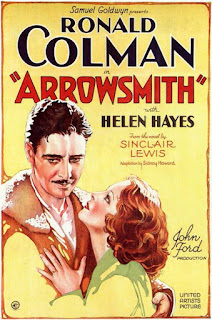Spoiler Alert: the point is to help people.
THE BOOK-Written by Sinclair Lewis, released 1925
THE MOVIE-Directed by John Ford, written by Sidney Howard, released 1931
THE STORY-With mentor's breath blowing mini-hurricanes into both ears, Dr. Martin Arrowsmith flip-flops from station to station, small-town savior one year, big-city budling the next. Respect comes easy, but recognition eludes.
MIND THE GAP-Not the inspiration for the band's name. Just ask 'em.
Once Arrowsmith enters college, Lewis's Pulitzer-winning prose pivots from dull to delightful, even as the story stretches credulity. The screenplay smartly dumps Marty's salad days into a biohazard bag. Unfortunately, the direction and cinematography took inspiration from the book's dreariest, driest patches. The vituperative score sounds like a scolding from a childless auntie.
"She came, with enthusiasm." In the 1920s? Dubious.
Received a Best Picture Oscar nod, 'cause sure. The Academy Awards were only five years old, and filling said category with the undistinguished likes of Five Star Final and Trader Horn. Dashing professional crusader struggles with heady moral issues at work and at home, oh yes Arrowsmith, right this way.
Even by the era's standards (theatrical over natural, self-absorbed poses separating self-conscious dialogue) Ronald Colman is an insufferable collision of awkward and smug. Helen Hayes fares better as the doctor's winsome wife Leora, if only by dint of being Helen Hayes.
Basically, Sinclair Lewis predicted the medical monopoly. The picture of a kindly, transparent caretaker--integrity incarnate!--was snatched from the frame and replaced with a collage of red tape and yellow lights. The healer, now, must also be a silver-tongued salesman--and a brown-tongued stooge.
Arrowsmith the novel boasts enviable relevance. Published seven years after the 1918 Spanish Flu pandemic, its appeal to modern audiences only increased a century later, as the world weathered the COVID-19 storm. Dr. Arrowsmith takes off for a Caribbean island ravaged by bubonic plague, vaccine in tow, but rather than dispense the unproven substance to a desperate population, the doctor decides a controlled test is best. Half of those on the island will receive the vaccine, the other half a placebo. Personal tragedy upends the plan, however, and Martin sacrifices scientific principle in the name of moral imperative.
Profit vs. patience. The individual's rights vs. the individual's responsibility to the group. Information is the impetus for war, not a path to peace. Innovation is mistrusted unless the benefits are instant. We are no longer on one team, we are enough teams to fill a competitive league, and all of the owners are corrupt--except, of course, for the owner of my team.
The brain and the heart cannot split up and still be friends.
BETTER IN YOUR HEAD-Sharing hellishly slow starts, neither Arrowsmith is worth a revisit. The book, at least, deserves a drop-in.


No comments:
Post a Comment